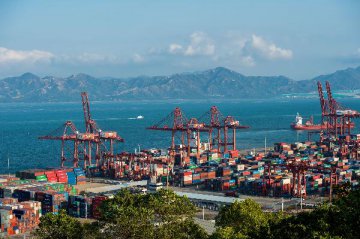
China’s economy still faces downside pressure in the second half year. With the continuous introduction of proactive fiscal policies, the economy is likely to bottom out. Industry insiders indicated that the macroeconomic adjustment will transfer to “ease fiscal policy plus stable monetary policy”. That means fiscal policy will play a greater role in the second half year. Specifically, proactive policy will be strengthened in respect of tax and charge reduction, optimization of expenditure structure and coordinated utilization of fiscal fund; provide stronger support to education, healthcare, agriculture and energy conservation and environment protection sectors; accelerate the division of responsibility of the central government and local governments and expending liability, as well as the establishment of local taxation system.
Scale of local government bond expected to increase
Analysts believe that one of the indications of continuing implementation of proactive fiscal policy in the next half year is the expansion of local government bond issuance.
Officials of the Ministry of Finance (MOF) said recently that China still has room for debt financing. The government can increase its deficit in certain stages to support enterprises’ deleverage. In the future, China will moderately expand the scale of the Treasury bond and local government bond. Analysts estimated that the scale of newly issued local government bond to reach 5 trillion to 6 trillion yuan during the year.
“The overall debt level of Chinese government is currently lower than the EU’s 60 percent, which is beyond the warning line. So Chinese government can increase its leverage, in order to support enterprises’ deleverage. Besides, local government debt is overall under control. In 2015, local government debt ratio (balance of indebtedness/comprehensive finance) was 89.2 percent, lower than the prevailing international warning line. And China’s local government debt was secured by quality assets,” said Wei Wei, analyst with Ping An Securities. “In addition, for the increase of deficit by the government, according to the revised budget law, to properly expand the scale of Treasury bond and local government bond are important measures for the government to increase leverage in a lawful way. It can also avoid the negative impacts of contraction of social debt on the economy.”
Recent data shows that the issuance of local government bond will enter a peak season of the year. According to statistics from Wind, as of May 24, the issued local government bonds amounted to 2.28 trillion yuan, approximating 38 percent of the annual issuance. Industry insider estimated that the total scale of local bond issuance for the year is expected to reach about 6 trillion yuan. On this basis, the issuance in April accounted for 20 percent of the total of the year, indicating a momentum of centralized issuance.
Accelerate implementing measures on tax and charge reduction
“Currently and in a period in the future, potential growth rate of China’s fiscal revenue will decline. But the upward trend of increasing fiscal expenditure has not changed. Thus there is contraction between fiscal revenue and expenditure. The financial department will continue to further reduce tax and charge, and cultivate impetus for development by the near-term reduction of fiscal revenue, so as to promote sustainable social economic development,” said MOF spokesperson Ou Wenhan.
Industry insiders believe that as the tax reduction policy of replacing business tax with VAT started, specific measures will be introduced in the second half year.
With respect to the specific measures, Ou indicated that for tax reduction, in addition to replacing business tax with VAT, the MOF will make further research to launch tax policy system in favor of mass entrepreneurship and innovation. Such policy system includes improve tax preferential policies for venture capital firms, and properly relax restrictions for venture capital firms to invest in high-tech enterprises; research and improve taxation polices for tech firm incubators and university science park, give preferential tax support to maker space.
In terms of reducing the charges, on one hand, the scheme should be fully implemented to clear up and standardize governmental funds according to Ou: cancelling the price adjusting fund; integrating seven funds, including fund to support reservoir region resettlement, whose taxers, charging patterns and purposes are similar; cancelling funds established by local governments but not meeting requirements. Furthermore, taxers with monthly sales or turnover no more than 30,000 yuan are exempted from extra charges of educational funds, local education and water works funds, and such tax exemption scope should be expanded to those with the figure no more than 100,000 yuan. On the other hand, tax reduction or exemption should be reinforced, and the policy of small & micro businesses exempting from related administrative charges should be studied to apply for all enterprises. The MOF will carry out guidance and supervision after policy issuance to guarantee the full implementation and actually ease the enterprises’ burden.
According to insiders, the target of fiscal deficit rate has risen to 3 percent from 2.3 percent since this year; governments further expand the bond issuance scale, and speed up the steps to reduce enterprises’ burden; fiscal policies are undoubtedly active. The macro control policies are transforming towards “easing finance + stable currency”. Although monetary policies narrow the margin, fiscal ones will play more important role, hence, it is not necessary to be too pessimistic on short-term economic trend.
Vitalize stock financial funds
Insiders indicated that fiscal policies actually playing a role requires stable growth and investment, intensified strength in taxes & charges reduction, but also more effective utilization of fiscal funds. Under current background of obviously slowing down fiscal revenue growth and prominent unbalance of financial income and expenditure, vitalizing the stock financial funds becomes a significant measure to incent fiscal policies.
CICC researcher Bian Quanshui believed that vitalizing the stock funds will improve the sustainability of positive fiscal policies, and avoid deflation risk caused by fiscal expenditure decline. As a factor to accelerate the cooperation between governments and social capital, PPP mode benefits to vitalize the fiscal funds and improve the investment efficiency. Local governments are more willing to stabilize the growth through infrastructure investment, and perform the contracts, beneficial to guarantee the social capital’s rights. The decrease in financing costs of PPP projects will boost social capital’s enthusiasm for participation. After several rounds of rate cuts, the financing costs reduce. The interest rate of infrastructure project capital from China Development Bank (CDB) is only 1.2 percent after fiscal subsidies. Along with intensified strength of CDB and local governments in PPP projects, private funds are more active now.
The central economic working conference determines to make more efforts for fiscal policies based on macro policy target of this year, and fully implement the existing policy deployments in the future, according to Li Huiyong, chief macro analyst of Shenwan Hongyuan Securities. Governments will continuously invest more in infrastructure projects of traffic fields, such as railway in Midwest China, urban metro, modern infrastructure. It will focus on a goal of smooth traffic for poor regions of Western China, and make up weaknesses when developing traffic & transportation in these regions.
The fiscal policies will play actual role in the second half year on time and response for stabilizing the growth, based on Xu Gao, chief economist at Everbright Securities. The MOF will enhance the financing demands to rebound again through conversion period plus with leverage, with a purpose of avoiding the economy caught into debt deflation. Meanwhile, financial strength will effectively ease the financing mechanism reform pressure of local governments to provide more time and space for clearing up old financing mechanisms.
Translated by Adam Zhang & Jelly Yi




















Latest comments